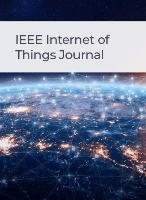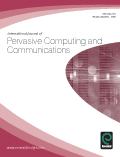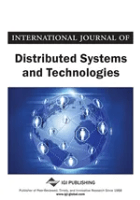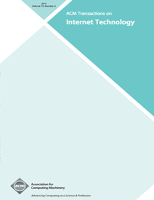
Internet of Things
Scope & Guideline
Connecting Ideas, Transforming Technologies
Introduction
Aims and Scopes
- Interdisciplinary Research in IoT:
The journal publishes research that spans various fields including computer science, engineering, healthcare, agriculture, and smart cities, reflecting the diverse applications of IoT technologies. - Security and Privacy Solutions:
A significant focus is on developing robust security frameworks and privacy-preserving solutions to address vulnerabilities in IoT systems, including the use of advanced cryptographic methods and blockchain technology. - Smart Systems and Automation:
Research on smart systems that utilize IoT for automation in sectors such as healthcare, agriculture, and industrial processes is a core area, emphasizing the role of IoT in enhancing operational efficiency. - Edge and Fog Computing:
The journal explores the integration of edge and fog computing with IoT, addressing challenges related to data processing, latency, and resource management in distributed environments. - Machine Learning and AI Integration:
There is a consistent emphasis on incorporating machine learning and artificial intelligence into IoT systems to enable intelligent decision-making, predictive analytics, and anomaly detection. - Sustainability and Environmental Monitoring:
Research addressing the use of IoT for environmental monitoring, resource management, and sustainable practices is increasingly prominent, highlighting the role of IoT in supporting sustainable development goals. - Standardization and Protocols:
The journal covers developments in IoT protocols, interoperability standards, and frameworks that facilitate seamless communication and integration among diverse IoT devices.
Trending and Emerging
- Federated Learning and AIoT:
There is a growing interest in federated learning approaches that enable collaborative data processing while preserving privacy, particularly in healthcare and smart city applications. - Blockchain for IoT Security:
The integration of blockchain technology for enhancing security and trust in IoT systems is increasingly popular, with research exploring decentralized authentication and data integrity. - Smart and Sustainable Cities:
Emerging themes focus on the role of IoT in smart city initiatives, particularly in areas like traffic management, environmental monitoring, and energy efficiency. - IoT in Healthcare:
The application of IoT technologies in healthcare is trending, particularly for remote patient monitoring, smart medical devices, and healthcare data management. - Digital Twin Technology:
The concept of digital twins is gaining traction for its potential to create real-time simulations of physical systems, enhancing monitoring and predictive capabilities. - Edge AI and Edge Computing:
Research increasingly emphasizes the deployment of AI algorithms at the edge to reduce latency and enhance the performance of IoT applications. - Environmental IoT Applications:
There is a notable trend towards using IoT for environmental applications, including precision agriculture, pollution monitoring, and resource management.
Declining or Waning
- Traditional Sensor Networks:
Research specifically focused on traditional wireless sensor networks (WSNs) is decreasing as the focus shifts towards more integrated IoT solutions that encompass a broader range of technologies and applications. - Basic IoT Applications:
There is a decline in papers discussing basic IoT applications without advanced features, as the field evolves towards more complex, data-driven, and intelligent systems. - Low-Power Wide-Area Networks (LPWAN):
While LPWAN technologies were once a hot topic, their coverage has reduced as researchers explore more comprehensive solutions that incorporate multiple communication technologies and protocols. - Standalone IoT Devices:
Research on standalone IoT devices that do not integrate with broader systems or networks is becoming less common, with a shift towards interconnected systems that emphasize interoperability.
Similar Journals

IEEE Internet of Things Journal
Leading the Charge in IoT Research and DevelopmentWelcome to the IEEE Internet of Things Journal, a leading publication in the field of connected systems and smart technologies. Published by the IEEE - Institute of Electrical and Electronics Engineers Inc, this journal is dedicated to disseminating cutting-edge research and innovative developments in the Internet of Things (IoT) domain. With an impressive impact factor and recognized as a Q1 journal across multiple categories such as Computer Networks and Communications, Information Systems, and Signal Processing, the IEEE Internet of Things Journal serves as an essential resource for researchers, industry professionals, and students looking to advance their knowledge and contribute to this rapidly evolving field. Since its inception in 2014, the journal has steadily risen to prominence, ranking impressively in Scopus metrics with top positions in key categories, ensuring high visibility and credibility in the academic community. We invite you to explore the rich array of articles and access options available to support your research endeavors in one of the most transformative areas of technology today.

Journal of Sensor and Actuator Networks
Connecting ideas, driving technological advancements.Journal of Sensor and Actuator Networks is a premier open-access journal published by MDPI, dedicated to advancing the field of sensor and actuator technology since its inception in 2012. With a commitment to disseminating cutting-edge research, the journal offers a platform for articles that explore the latest innovations and applications in the realms of computer networks and communications, control and optimization, and instrumentation. It proudly holds a prestigious Q1 ranking in instrumentation and Q2 rankings in both computer networks and control and optimization as of 2023, emphasizing its significant impact within these domains. The journal is indexed in Scopus and is recognized for its high-quality contributions, with impressive rankings including 9th in control and optimization and 19th in instrumentation. Researchers, professionals, and students seeking to stay at the forefront of sensor and actuator technologies will find a wealth of insightful articles and studies within its pages. As an open-access journal, it ensures that knowledge is widely accessible, fostering collaboration and innovation across the global scientific community. For more information, the journal is based in Basel, Switzerland, situated at ST ALBAN-ANLAGE 66, CH-4052 BASEL, SWITZERLAND.

International Journal of Pervasive Computing and Communications
Connecting ideas, enhancing experiences.The International Journal of Pervasive Computing and Communications, published by EMERALD GROUP PUBLISHING LTD, is a leading academic journal dedicated to advancing the field of pervasive computing and communications. With an ISSN of 1742-7371 and an E-ISSN of 1742-738X, this journal serves as a premier platform for researchers, professionals, and students to explore innovative applications and technologies that enhance connectivity and computing experiences. Operating from the United Kingdom, the journal has consistently maintained a strong impact within the academic community, achieving impressive Scopus rankings, including a Q2 status in Computer Science (miscellaneous) and Q3 in Theoretical Computer Science, as of 2023. The journal encompasses a broad scope, encouraging papers that discuss interdisciplinary approaches and novel methodologies in computing. By sharing cutting-edge research, the International Journal of Pervasive Computing and Communications plays a vital role in shaping the discourse surrounding pervasive technologies and their societal impacts, making it an essential resource for those looking to remain at the forefront of this dynamic field.

International Journal of Distributed Systems and Technologies
Advancing the Future of Distributed Systems.Welcome to the International Journal of Distributed Systems and Technologies, a prominent academic platform published by IGI Global dedicated to advancing the field of distributed systems and technologies. With an ISSN of 1947-3532 and an E-ISSN of 1947-3540, this journal, established in 2010 and continuing through 2024, offers a unique venue for researchers, professionals, and students to disseminate their findings in the realms of computer networks, communications, hardware, and architecture. Despite its current placement in the Q4 quartile for both computer networks and communications and hardware and architecture categories in 2023, the journal is committed to fostering innovative solutions and interdisciplinary collaboration that can drive future advancements. Although not open access, contributions to this journal not only receive rigorous peer review but also have the potential to significantly impact the community, underscored by a focus on applicable research that addresses the emerging challenges in technology. As part of a rich repository, the journal invites you to explore its latest issues and join in shaping the future of distributed systems.

Journal of Grid Computing
Empowering Innovation in Grid TechnologiesThe Journal of Grid Computing, published by Springer, stands as a pivotal resource in the dynamic field of computer science, particularly within the realms of Computer Networks and Communications, Hardware and Architecture, Information Systems, and Software. With an impressive Q1 ranking across these categories in 2023, the journal exemplifies excellence and rigor, catering to a diverse readership from researchers to industry professionals. Established in 2003, this esteemed journal is anchored in the Netherlands and releases cutting-edge research that reflects trends and advancements in grid computing technologies. Researchers can gain insights through its vast contributions, while institutions benefit from its prestigious standing within the SCOPUS framework, boasting high percentile ranks in multiple computer science categories. Though not open access, the journal provides unparalleled access options for institutional subscribers, solidifying its importance as a gateway to innovative discoveries in high-performance distributed computing.

International Journal of Web Services Research
Connecting Researchers to the World of Web ServicesThe International Journal of Web Services Research, published by IGI Global, is a premier forum dedicated to advancing research and innovation in the field of web services. With an ISSN of 1545-7362 and an E-ISSN of 1546-5004, this journal has steadily contributed to the discourse on computer networks, information systems, and software development since its inception in 2004. Based in the United States, the journal publishes high-quality research articles that delve into cutting-edge web service technologies and methodologies, making it an invaluable resource for researchers, professionals, and students alike. Although categorized in the Q4 quartile in 2023 across several classifications, its growing impact and relevance are reflected in its ongoing engagement with contemporary issues in the web services landscape. As an academic platform, it aims to provide a comprehensive understanding of the dynamics of web services and their implications for future technological advancements. Researchers are encouraged to contribute their findings to foster knowledge sharing and collaboration within this vital domain.

Human-centric Computing and Information Sciences
Championing Open Access for Global Knowledge ExchangeHuman-centric Computing and Information Sciences, published by the Korea Information Processing Society, represents a leading platform in the field of computer science, particularly focusing on the interaction between humans and computational systems. With an impressive Q1 ranking in the 2023 category of Computer Science (miscellaneous) and a commendable Scopus rank of #14/232 (94th percentile), this journal has established itself as a cornerstone for researchers and practitioners dedicated to advancing understanding in this vital area. Understanding the significance of making technology more accessible and effective for users, the journal has been an Open Access publication since 2011, promoting wide dissemination of knowledge without barriers. The journal's scope encompasses innovative methodologies, user experience design, and the integration of human factors into computing environments, making it essential reading for anyone interested in the intersection of technology and society. With all articles freely accessible, the journal not only contributes to scholarly discourse but also encourages collaboration among researchers worldwide, fostering further advancements in human-centric computing.

International Journal of Grid and Utility Computing
Transforming Ideas into Practical Computing SolutionsInternational Journal of Grid and Utility Computing is a pioneering publication dedicated to advancing research in the domains of grid computing, utility computing, and their applications across various sectors. Initiated in 2005 and continuing through 2024, the journal is published by INDERSCIENCE ENTERPRISES LTD, a respected publisher known for its commitment to facilitating scholarly communication. With an ISSN of 1741-847X and an E-ISSN of 1741-8488, this journal, based in the United Kingdom, serves a global audience of researchers, professionals, and students. Although classified in the Q4 category across Applied Mathematics, Computer Science Applications, and Management Information Systems, the journal aims to bridge theoretical research with practical implementation, fostering interdisciplinary collaborations. Researchers looking for a platform to disseminate their work on grid technology and its utility in modern computing environments will find this journal an invaluable resource. The focus on innovative computing methodologies places it at the forefront of emerging trends and technology applications, despite the need for increased visibility in competitive metrics like Scopus rankings.

ACM Transactions on Internet Technology
Fostering Knowledge Exchange in Network ResearchACM Transactions on Internet Technology, ISSN 1533-5399 (E-ISSN 1557-6051), is a premier journal published by the Association for Computing Machinery (ACM) that has made significant contributions to the field of computer science, particularly in the areas of computer networks and communications. Established in 2001, this journal has swiftly ascended to a prestigious Q1 ranking in its category as of 2023, demonstrating its influence within the scientific community, evidenced by its high Scopus rank of #41 out of 395 journals and a remarkable 89th percentile ranking. The journal serves as a vital platform for researchers, professionals, and students, offering a spectrum of scholarly articles that explore advancements in Internet technology, design, applications, and performance. With a commitment to high-quality research, ACM Transactions on Internet Technology is dedicated to fostering knowledge exchange and innovative problem-solving in an ever-evolving technological landscape. Readers can look forward to insights into both theoretical frameworks and practical implementations, making it an essential resource for cutting-edge research and developments in the digital frontier.

Scalable Computing-Practice and Experience
Exploring Innovative Solutions in Scalable SystemsScalable Computing - Practice and Experience, published by UNIV VEST TIMISOARA, stands as a significant platform for research and discourse in the realm of computer science, particularly focusing on practical applications and scalability in computing systems. Established in 2005, it aims to bridge the gap between theoretical advancements and real-world implementations, catering to a diverse readership that includes researchers, professionals, and students who are keen on exploring innovative computing practices. With an H-index reflective of its contribution and a Category Quartile of Q3 in Computer Science (miscellaneous), the journal offers a rich repository of knowledge, albeit currently not open access, from its base in Timisoara, Romania. The journal is included in Scopus rankings, underscoring its relevancy with a current rank of #144 out of 232 in the General Computer Science category, placing it in the 38th percentile. It invites contributions that expand the horizons of scalable computing methodologies and experiences, making it a vital resource for those engaged in this rapidly evolving field.